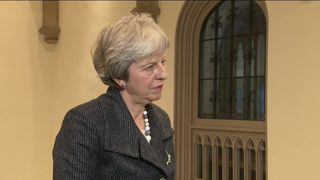Chancellor Philip Hammond is due to set out the government's analysis of the economic impact of Brexit.
The Bank of England (BoE) will also deliver its assessments on Wednesday as Theresa May heads to Scotland to press the case for her agreement with Brussels.
Downing Street has said the Treasury's papers will cover a "range of scenarios".
The analysis is expected to conclude the UK would be better off under the terms of Mrs May's agreement than it would in the event of a "no-deal" Brexit.
Mr Hammond and BoE governor Mark Carney have both stressed the importance of a transition period to ease Britain out of the EU, which could be lost if parliament votes against the deal on 11 December.
Brexit: What to expect in the next two weeks
The bank has said it will publish its assessment of the monetary and financial stability implications of the withdrawal agreement, along with other possible Brexit scenarios, at 4:30pm on Wednesday.
Mr Carney said earlier in November that the impact of leaving the EU with no transition period could be likened to the 1970s oil crisis.
The governor and other senior officials at the central bank have also warned investors not to count on cuts to interest rates in the event of a no-deal shock to the economy.
Ministers have agreed to publish their assessment of the impact on the economy if Britain were to stay in the EU, having been faced with the prospect of a damaging Commons defeat if they refused.
The prime minister is pressing the case that her Brexit agreement is the only way to protect jobs and investment, while also avoiding the potential chaos of leaving the EU without a deal.
Mrs May hit back at US President Donald Trump on Tuesday, as he suggested the terms of her settlement would hamper the UK's ability to sign a post-Brexit trade deal with the US.
Woody Johnson, the US ambassador to the UK, has since told the prime minister that Brexit is a matter for the British people to decide.
Mrs May will travel to Scotland for a day of campaigning on Wednesday as she appeals over the heads of MPs for ordinary voters to support her plan.
The prime minister will argue that her agreement offers the prospect of an "unprecedented economic partnership" with the EU after Brexit.
She is expected to say: "At long last, we will be 'an independent coastal state' again – taking back full sovereign control over our waters, and free to decide for ourselves who we allow to fish in our waters.
"The EU maintained throughout the negotiation process that it wanted to link overall access to markets to access to fisheries.
Analysis: Is Donald Trump right about the Brexit plan hurting a UK-US trade deal?

"It failed in the withdrawal agreement and it failed again in the political declaration.
"I have been robust in defending the interests of Scottish fisherman so far – and I will always be so."
Mrs May has clashed with First Minister Nicola Sturgeon ahead of the visit.
The Scottish National Party (SNP) leader released a report claiming the prime minister's deal would cost people in Scotland £1,610 a year by 2030, compared to if the UK had remained in the EU.
Ms Sturgeon believes the "backstop" being put in place to prevent the return to a hard border in Ireland could leave Scotland at a "serious competitive disadvantage" to Northern Ireland.
She said: "In short, it will make us poorer.
"No government of Scotland with the interests of this and future generations at heart could possibly accept it."
Mrs May spent Tuesday campaigning in Wales and Northern Ireland.
While she appeals directly to voters to support her plan, some have suggested she might be better off trying to win over politicians in Westminster.
Scores of Mrs May's own MPs have declared publicly they will vote against the deal.
Labour and other oppositions parties have also opposed, with ministers admitting the parliamentary arithmetic is "challenging".
They are expected to use the next two weeks to argue there is no Commons majority for any of the alternative proposals being suggested in Westminster, meaning the prime minister's agreement is the only alternative to no-deal.
 4:50
4:50The government has become embroiled in a row over the publication of the Attorney General Geoffrey Cox's legal advice on the withdrawal agreement.
Labour's shadow Brexit secretary Sir Keir Starmer is pressing ministers to comply with a binding Commons motion to publish the full advice after ministers dropped their opposition to the motion to avoid a damaging defeat.
More from UK
Downing Street has only said the Government would be releasing a "full reasoned position statement" laying its out political and legal position on the withdrawal agreement.
The prime minister's official spokesman said the move was in line with an undertaking given to MPs by Cabinet Office Minister David Lidington in the House.
[contf]
[contfnew]

Sky News
[contfnewc]
[contfnewc]







